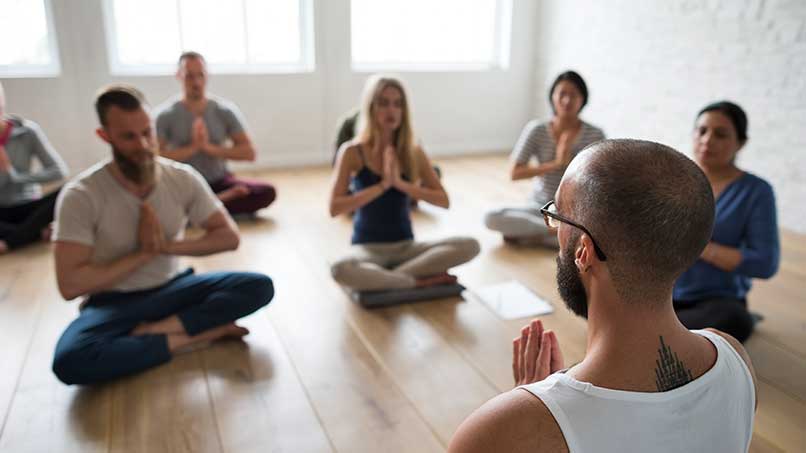A holistic treatment program is a non-medical substance abuse treatment type that incorporates holistic therapies into its curriculum.
It may include holistic treatment modalities such as yoga, meditation, acupuncture, massage, nutrition counseling, herbal remedies, and more.
These holistic therapies can complement traditional treatment methods like detox, counseling, and medication-assisted treatment.

Holistic treatment offers many potential benefits for overcoming drug or alcohol addiction.

Holistic therapies enhance recovery by addressing the whole person. They offer personalized, comprehensive approaches to addiction treatment programs, improving wellness and quality of life during recovery.
Here are some types of holistic addiction therapies:
Guided Meditation
Guided meditation involves relaxation techniques to enhance focus and reduce stress, aiding addiction treatment. The meditation method used depends on individual needs.
Yoga
Yoga is a holistic therapy that can help relax the body and mind, improve breathing and circulation, and enhance mood and self-awareness. It also helps with pain, insomnia, and anxiety.
Acupuncture
Acupuncture is an ancient Chinese practice involving thin needles inserted into specific body areas to stimulate the energy flow or qi. Acupuncture can help with detoxification, cravings, withdrawal symptoms, and emotional issues.
Aromatherapy
Aromatherapy uses essential oils to promote healing. It aids in stress relief, mood enhancement, pain reduction, and immune support.
Art Therapy
Art therapy encourages expression through media like painting and sculpture. It helps with self-esteem, communication, coping, and trauma resolution.
Nutrition Therapy
Nutritional therapy is a vital component of holistic addiction treatment that focuses on healing the body from the inside out.
It recognizes that the foods we eat directly impact our overall well-being. Just as a car needs the right fuel to run smoothly, our bodies need proper nutrition to function optimally, especially during recovery.
Exercise
Exercise is another form of holistic therapy helpful in treating addiction.
Exercise can help reduce withdrawal symptoms, relieve stress, and improve overall wellness. It also enhances physical health, cardiovascular health, strength, and bone density.
Massage Therapy
Massage relieves tension and pain by manipulating soft tissues. This holistic therapy aids relaxation, circulation, and toxin elimination and helps with anxiety, depression, insomnia, and chronic pain.
Animal-Assisted Therapy
Animal-assisted therapy is a type of holistic therapy that involves interacting with animals such as dogs, cats, horses, or dolphins.
It can help with social skills, empathy, trust, motivation, and self-esteem. Animal-assisted therapy can also help relieve stress, improve mood, and provide emotional support.
Tai Chi and Qigong
Tai Chi and Qigong involve slow, flowing movements and controlled breathing. They promote relaxation, flexibility, and balance while reducing stress and anxiety. These practices can be beneficial for both mental and physical health during recovery.
Music Therapy
Music therapy uses music to address emotional, cognitive, and social needs. It can help individuals express themselves, manage stress, and process difficult emotions. Therapeutically engaging with music can provide a positive outlet for emotions and contribute to overall healing.
Spiritual Exploration
Holistic rehab often encourages individuals to explore their spiritual beliefs or practices. This could involve meditation, prayer, or connecting with nature. Spiritual development can provide a sense of purpose, inner peace, and greater clarity during recovery. 
Holistic approaches to addiction recovery address these interconnected aspects, offering a path that reduces the risk of relapse and promotes lasting wellness.
Mindfulness meditation, yoga, and counseling all help individuals become more aware of triggers, manage stress, and heal underlying emotional wounds that often contribute to addiction.
Even maintaining physical health through balanced nutrition, regular exercise, and alternative therapies like acupuncture supports the body’s recovery and strengthens resilience against cravings.
Engaging in spiritual practices or community involvement fosters a sense of purpose and belonging, which are crucial for maintaining motivation and commitment to sobriety.
It helps through supportive networks and developing meaningful relationships that encourage accountability and positive growth.
Substance abuse is a complex and multifaceted problem.
Traditional treatment methods, such as medication, counseling, and behavioral therapy, can help address some of the symptoms and consequences of substance abuse. Still, they may not be enough to heal the root causes and promote lasting recovery.
That’s why holistic drug rehab centers offer complementary or alternative approaches to overcoming addiction.
Sometimes referred to as complementary and alternative medicine, they can also help prevent relapse and promote long-term recovery from substance use disorders.
Holistic techniques are not a substitute for conventional treatment but can complement them and boost their effectiveness.
Holistic psychotherapy is another form of holistic treatment that focuses on the recovery of emotional and spiritual aspects.
Holistic psychotherapy may help clients identify and resolve the underlying issues contributing to their drug abuse, such as trauma, low self-esteem, or unresolved grief.
Such treatments may also help clients develop coping skills, self-awareness, and self-confidence that can improve the quality of their everyday life.
At Bridges Sober Apartments, we understand that true healing goes beyond the surface. As a structured sober living home for women and men, we believe in nurturing your mind, body, and spirit on your journey to lasting wellness.
Unlock the power of holistic healing through our supportive community, empowering environment, and tailored resources. Experience the transformation from finding balance and purpose in every recovery step.
Contact us to regain control of your life today.
Breslin, Kathy T., et al. “An Holistic Approach to Substance Abuse Treatment.” Journal of Psychoactive Drugs, vol. 35, no. 2, Informa UK Limited, June 2003, pp. 247–51. Crossref, https://doi.org/10.1080/02791072.2003.10400006.
Winkelman, Michael. “Alternative and Traditional Medicine Approaches for Substance Abuse Programs: A Shamanic Perspective.” International Journal of Drug Policy, vol. 12, no. 4, Elsevier BV, Oct. 2001, pp. 337–51. Crossref, https://doi.org/10.1016/s0955-3959(01)00100-1.
Giesen, Esther S., et al. “Clinical Exercise Interventions in Alcohol Use Disorders: A Systematic Review.” Journal of Substance Abuse Treatment, vol. 52, Elsevier BV, May 2015, pp. 1–9. Crossref, https://doi.org/10.1016/j.jsat.2014.12.001.
Khanna, Surbhi, and Jeffrey M. Greeson. “A Narrative Review of Yoga and Mindfulness as Complementary Therapies for Addiction.” Complementary Therapies in Medicine, vol. 21, no. 3, Elsevier BV, June 2013, pp. 244–52. Crossref, https://doi.org/10.1016/j.ctim.2013.01.008.
Aletraris, Lydia, et al. “The Use of Art and Music Therapy in Substance Abuse Treatment Programs.” Journal of Addictions Nursing, vol. 25, no. 4, Ovid Technologies (Wolters Kluwer Health), Oct. 2014, pp. 190–96. Crossref, https://doi.org/10.1097/jan.0000000000000048.
Wesley, Martin C., et al. “Animal-Assisted Therapy in the Treatment of Substance Dependence.” Anthrozoös, vol. 22, no. 2, Informa UK Limited, June 2009, pp. 137–48. Crossref, https://doi.org/10.2752/175303709×434167.